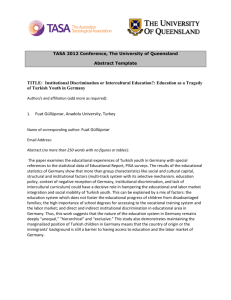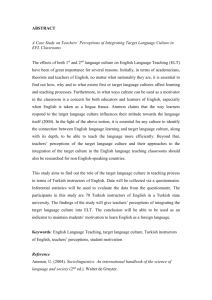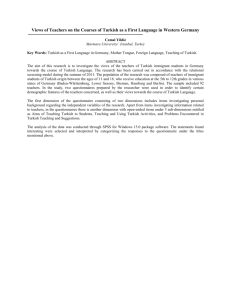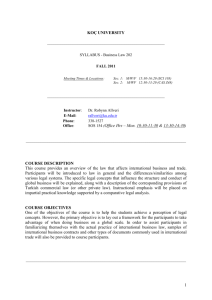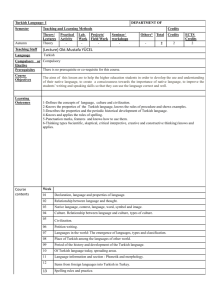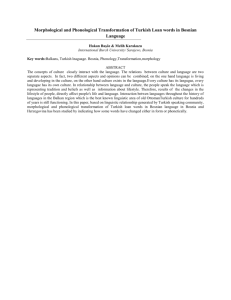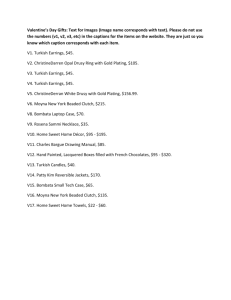TE 510: Curriculum and Instruction January 6, 2014 Annotated
advertisement
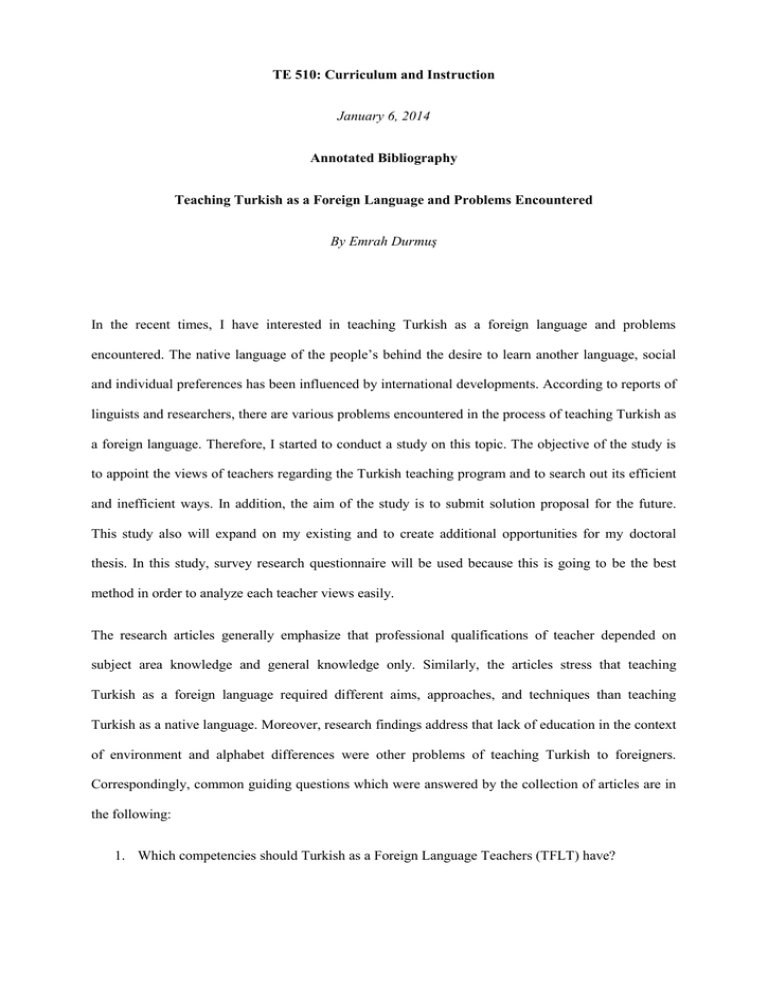
TE 510: Curriculum and Instruction January 6, 2014 Annotated Bibliography Teaching Turkish as a Foreign Language and Problems Encountered By Emrah Durmuş In the recent times, I have interested in teaching Turkish as a foreign language and problems encountered. The native language of the people’s behind the desire to learn another language, social and individual preferences has been influenced by international developments. According to reports of linguists and researchers, there are various problems encountered in the process of teaching Turkish as a foreign language. Therefore, I started to conduct a study on this topic. The objective of the study is to appoint the views of teachers regarding the Turkish teaching program and to search out its efficient and inefficient ways. In addition, the aim of the study is to submit solution proposal for the future. This study also will expand on my existing and to create additional opportunities for my doctoral thesis. In this study, survey research questionnaire will be used because this is going to be the best method in order to analyze each teacher views easily. The research articles generally emphasize that professional qualifications of teacher depended on subject area knowledge and general knowledge only. Similarly, the articles stress that teaching Turkish as a foreign language required different aims, approaches, and techniques than teaching Turkish as a native language. Moreover, research findings address that lack of education in the context of environment and alphabet differences were other problems of teaching Turkish to foreigners. Correspondingly, common guiding questions which were answered by the collection of articles are in the following: 1. Which competencies should Turkish as a Foreign Language Teachers (TFLT) have? 2. Which materials and sources should be used in order to contribute to the professional competencies of TFL teachers? 3. How should professional efficiency be determined in TTFL process? 4. What are the main reasons for doing errors in Turkish? 5. What are the solutions to cope with linguistic problems while teaching TFL? 6. Which competencies should TLL centers have? Açık F. (2008). Türkiye’de yabancılara Türkçe öğretilirken karşılaşılan sorunlar ve çözüm önerileri. Doğu Akdeniz Üniversitesi Eğitim Fakültesi Türkçe Eğitimi Bölümü, Uluslararası Türkçe Eğitimi ve Öğretimi Sempozyumu, 1-11. This study emphasized that teaching Turkish as a foreign language centers were not qualified yet in terms of the planning, practicing, assessment of foreign language, description of the member of language. According to author of article, even though there were conducted a survey research, survey results were not reliable in order to understand the quality of language centers. In the article, the history of Turkish as a foreign language also was mentioned by the author. The aims of the study, to found clearly out the problems of teaching Turkish as a foreign language, to discussed on the problems and to offered possible solutions. For these purposes, teaching centers, students and instructors were analyzed by the author. As a result, according to the research findings, managers, instructors, students and teaching environments were pretty good. However, reliability of the questionnaire responses was not enough to pass judgment on whether it’s pass or fail. 100 participants who studied three different TLL centers were randomly selected in the survey. 85% of the participants were Turkic speaking countries and their main purpose was to study in Turkey. 54% of participants were satisfied to competences of TLL instructors. Firstly, this research helped me in terms of understanding the students of Turkic speaking countries. Although they were the member of Turkic family, could not deal with the grammatical and alphabetical problems. Secondly, I understood that sometimes the survey questionnaire is not reliable to conduct a research. Therefore, I will consider my research method while start to study. Chmielowska D., Dikici I. Z. (2012). The difficulties in the teaching of Turkish as a foreign language. Procedia-Social and Behavioral Sciences, 70, 1609-1613. Firstly, the article stressed that background of Turkish language teaching in Poland based on diplomatic relationship between former Turkey and Poland. Teaching Turkish language started in the seventeenth century thanks to Orientalism. However, the evidence showed that there was a failure in the school system and lack of program in the school about teaching Turkish. They established a school of which name was The School of Oriental Sciences and determined some rules about the school. Students had to learn about Turkey and Poland, with particular emphasis on economic as well as history, geography, and constitutional affairs. Later, linguists arranged the grammar of Turkish. Although there was a war in the middle of the twentieth century and many schools interrupted the lesson running in Poland, teaching Turkish expanded with several new research and educational centers after the war. Secondly, the theory emphasized that the new methodological principles have been reflected both in linguistics and the teaching of Turkish in modern times. However, the quality of textbooks was occurred a problem in the teaching of Turkish as a foreign language. There were not as many textbooks in Turkish as there were in English. Additionally, Turkish teacher needed to have good command of both languages and a good knowledge of grammar that were required to teach a foreign language. In conclusion, Turkish should be used as practical science and authentic conversation by the student and teacher. They should make effort and take more active part in the life of the Turkish community. Furthermore, both student and teacher should get to know about their customs and habits used in everyday life. This theory assisted me in terms of understanding a foreigner who is Turkish teacher and gained a different viewpoint about Turkish teaching methods. I strongly agree with him that to learn a language is required to know their customs and habits used in everyday life. In this way, learner can understand the context of daily life and emotions of people. Çalışkan G., Karababa Z. C. (2012). Teacher competencies in teaching Turkish as a foreign language. Procedia-Social and Behavioral Sciences, 70, 1545-1551. The article emphasized that the most important component of an educational system is teacher. According to researchers the success of an educational system basically depends on the qualifications of teachers and other education staff who will operate and implement the system. However, in Turkey, there was a lack of not only pre-determined acceptance criteria or competencies for TFL teachers but undergraduate programs, as well. TFL teachers should have different perspectives, attitudes and values in order to understand people who came from different countries of the world. The purpose of the research was to determine teacher competencies for teachers who teach Turkish to foreigners. Researchers suggested that the competencies of teachers who teach Turkish to foreigners based on the opinions of the experienced TFL instructors. Therefore, they prepared a questionnaire in order to describe instructor knowledge and opinions about teacher competencies. Research findings were ordered eleven main competencies from most important to least important. According to instructors’ opinions the most important competency was to know the grammatical features of Turkish and the least important one was to know the curriculum. In the same way, printed sources, learner level, exercise book, organizing drama activities, communicative method, questionanswer technique, oral examination, self-assessment were other most effective ways to learn Turkish. In contrast, according to instructors’ opinions least effective ways were the following respectively: knowledgeable and experienced people, different cultures, jokes and idioms, going to the theatre or cinema, group teaching, pictures, observations, making no assessment. As a result, researchers ordered these recommendations from most important to least important instead of conclusion. 26 instructors who professional experience of the participants ranges between 2 - 25 years and working different branches of an institution participated in the survey. In this research, a questionnaire was used as the data collection tool. The questionnaire contained 9 questions in order to determine teacher competencies in the field of TTFL. Descriptive analysis was used to analyze the research data. This research helped me to understand different attitudes of teaching Turkish to foreigners. There was lots of information to demonstrate teaching Turkish actively. Thus, this research can lead the field in terms of methodology and content for my thesis. Karababa Z. C. (2009). Teaching Turkish as a foreign language and problems encountered. Ankara University, Journal of Faculty of Educational Sciences, 42, 265-277. The research mainly addressed that universities and private institutions applied different levels of course curricula. In this study, the problems of encountered in the teaching of Turkish as a foreign language were reviewed in terms of education programs, education environments and the students. According to the author, for the solving curricula problem, there was need for a curriculum, which is suitable for the needs of the target group, and prepared according to the level of students. Another problem was that age was not considered when the curricula were being prepared. Further, there were multi language and multicultural learning environments involving students from different cultures which share the same environment. Consequently, functional aspects of Turkish grammar and every aspect of the work should be a resource for teaching Turkish as a foreign language. A special program for Turkish children who are living abroad should be conducted various courses for learning Turkish. In addition, teaching instructors who are sensitive to different cultures and traditions are needed. One of the qualitative research methods, which is data analysis, was carried out via semi-structured interviews in the study. The participants of the study, experienced instructors of teaching Turkish to foreigners were at least 10 years. The voluntary teaching staff was employed both in two schools subject to universities and a private school subject to the Ministry of Education. As can be seen from the article, the first and main problem is curricula. Teaching Turkish should be considered two main titles: teaching Turkish as a mother tongue and a foreign language. Therefore, carrying out the same curriculum for each title can cause lack of information for the foreigners who learn Turkish as a foreign language. Institutions, universities, and language schools need to certificate of conformity to standard, which is covered common curriculum and given by The Council of Higher Education (YÖK). Tüm G. (2012). Reasons for errors done by Belarusian learners learning Turkish as a foreign language. Hacettepe University Journal of Education, 42, 418-429. This study investigated that learners who are linguistically different communities (Byelorussian/Russian) were observed to make errors while learning Turkish. Constitutively, grammatical, lexical and semantic differences were detected by the author while learning process of TFL. In addition, comparing Russian and Turkish in terms of similarities and dissimilarities, certain features such as the alphabetic system, synthetic language vs agglutinative, article, gender, verb, adjective and word order were observed. Sentences samples were applied in the part of the analysis in order to analyze these issues and doing errors classified by the author. As a result, learners used different learning strategies in order to understand the functions of language. However, during their learning process, they encountered many difficulties such as interference from the native language, unfamiliarity of words in a new language, the complexity of the foreign language they are learning, and so on. Dealing with these difficulties, the participants could be involved in motivating activities or encouraged them to appropriate strategies for creating different structural statements. Taking all these difficulties into account mentioned above, the author concluded that the role of language teachers plays an important part in activating learners’ both cognitive skills and creative thinking abilities in classes. In the study, participants were randomly selected at Minsk State Linguistics University, Belarus. (n=35) They studied Turkish 4 hours per week as a 2nd or a 3rd foreign language and Turkish lesson were given to them by one native speaker and one local teacher, who teaches Turkish as a foreign language for 5 years. The author of study used data collection which involves a pool grammar test and essays. All participants written texts and tests were analyzed twice by Turkish teacher and native speaker in order to classify the type of errors. I had difficulties in analyzing the study in terms of understanding and evaluating technical terms. On the other hand, encountered another difficulty was that different languages were compared with another language by the author. Nevertheless, these difficulties have never stopped my learning process. On the contrary, mentioned issues have expanded my horizons in the field of TFL. That’s why I favor this view is that student-centered learning difficulties can help teacher in order to gain a different viewpoint. Yıldız Ü. (2012). The need for a department of teaching Turkish as a foreign language: A proposal. Procedia-Social and Behavioral Sciences, 70, 1839-1846. The author of article claimed that Turkish have been spoken by 165 million people all over the world either as a native or foreign language. According to United Nations data, Turkish is the biggest and most common language behind Chinese, English and Indian. The author importantly dwelled on to deliver quality and effective foreign language instruction, a clearly defined language curriculum is needed. Accordingly, in order to apply a successful education teaching process, the aims, content, methods and the evaluation dimensions of the program should be clearly defined by the official authorities. According to author, another important issue was that there was no Turkish as a Foreign Language Undergraduate Program in Turkey. A few universities made proposals to Council of Higher Education in order to open TTFL undergraduate departments but did not take positive results. In conclusion, author suggested that as the first step governmental organizations or commissions should establish in order to coordinate such actions and activities in the field of TTFL because of the lack of coordination among the lecturers who are teaching Turkish as a foreign language both in Turkey and abroad. Moreover, new materials in the field of TTFL should be developed by the competent authorities and TTFL teachers should not take KPSS (State Personnel Selection Examination) exam in order to register TTFL undergraduate programs. Lastly, competent authorities should consider curriculum specialist, field experts who have experience in TTFL and design a curriculum model that will best expectations of all share holders. The article supported my future study in terms of the important of curriculum. Taking all these information into account mentioned above, I can conclude that curriculum is the most important issue in TTFL and any educational process cannot work without a special curriculum. I will use a questionnaire in my study and prepare many questions about the important of curriculum.
